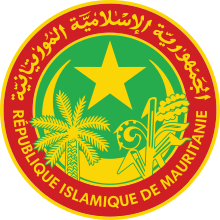National anthem of Mauritania
| English: National Anthem of Mauritania | |
|---|---|
 | |
National anthem of | |
| Lyrics | Baba Ould Cheikh, 18th century |
| Music | traditional (arrangement Tolia Nikiprowetzky) |
| Adopted | 1960 |
| Audio sample | |
National Anthem of Mauritania (instrumental) | |
The words of the National Anthem of Mauritania (Template:Lang-ar) are taken from a poem written in the late 18th century by Baba Ould Cheikh; the melody was written by Tolia Nikiprowetzky. The anthem was adopted upon independence in 1960. The unusual and highly complex rhythm of the anthem makes it extremely difficult to sing; for this reason, the anthem is often erroneously listed as wordless.[1]
| Arabic | Transliteration | French | English translation |
|---|---|---|---|
|
|
|
|
Arabic:
كن للاله ناصرا وأنكر المناكرا وكن مع الحق الذي يرضاك منك دائرا ولا تعد نافعا سواه أو ضائرا واسلك سبيل المصطفى ومت عليه سائرا وكن لقوم احدثوا في أمره مهاجرا قد موهوا بشبه واعتذروا معاذرا وزعموا مزاعما وسودوا دفاترا واحتنكوا أهل الفلا واحتنكوا الحواضرا وأورثت أكابر بدعتها أصاغرا وإن دعا مجادل في أمرهم إلى مرا فلا تمار فيهم إلا مراء ظاهرا
Arabic (transliterated):
Kun lil-ilahi nasiran, wa-ankir al-manakira Wa-kun maʿa l-haqqi l-ladhi yarda-hu minka da’ira Wa-la ta ʿuddu nafi ʿa siwa-hu aw da’ira Wa-sluk sabila l-mustafa wa-mutt ʿalayhi sa’ira Fa-ma kafa awwalana a-laysa yakfi l-akhira Wa-kun li-qawmin ahdathu fi amrihi muhajira Qad mawwahu bi-shibhin wa- ʿtadhiru ma ʿadhira, Wa-za ʿamu maza ʿima wa-sawwadu dafatira, Wa-htanaku ahla l-fala, wa-htanaku l-hawadira Wa-awrathat akabira bid ʿatuha asaghira Wa-in da ʿa mujadilun fi-amri-him ila mira Fa-la tumari fihim illa mira’a zahira
English:
Be a helper for God, and censure what is forbidden,
And turn with the law which, which He wants you to follow,
Hold no one to be useful or harmful, except for Him,
And walk the path of the chosen one, and die while you are on it!
For what was sufficient for the first of us, is sufficient for the last one, too.
And leave those people who do evil things with respect to God.
They misrepresented him by making him similar, and made all kinds of excuses.
They made bold claims, and blackened notebooks.
They let the nomads and the sedentary people, both make bitter experiences,
And the great sins of their innovations bequeathed small.
And just in case a disputant, calls you to dispute about their claims,
Do not, then, dispute on them, except by way of an external dispute.
References
- ^ "National Anthem of Mauritania". NationalAnthems.me. Retrieved 2012-02-24.
External links
